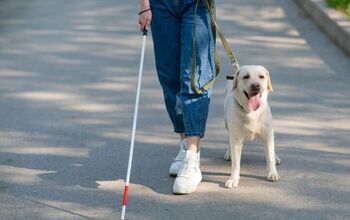New Study Reveals Dogs Can Sniff Out Neurodegenerative Diseases

We all know that doggos have incredible noses and a superb sense of smell. It is tens of thousands of times stronger than our own. This makes us wonder – what secrets can such a sense of smell unveil? Many scientists consider the canine sense of smell a great potential to enhance human lives thanks to its accuracy. And that is exactly what was unveiled in a recent study published in “bioRxiv”, by researchers Samuel V. Johnston and Lisa Holt from Cold Spring Harbor Laboratory. Thanks to their efforts, and the incredible abilities of doggos, it was revealed that our four-legged friends have the potential to detect neurodegenerative diseases, such as Parkinson’s.
Parkinson’s disease is a terrible condition, affecting primarily seniors. What is even worse is that this disease has many difficulties in diagnosis, which prevents doctors from accurately identifying the disease in the early stages. But the breakthrough study could change all that! Thanks to doggos and their powerful noses, we could be on the brink of completely changing the way Parkinson’s is diagnosed.
“Dogs have an extraordinary olfactory capability, which far exceeds that of humans. Dogs’ sense of smell seems to be the main sense, allowing them to not only gather both current and historical information about their surrounding environment, but also to find the source of the smell, which is crucial for locating food, danger, or partners for reproduction.” writes Agata Kusiak, from the Institute of Animal Sciences, Warsaw University. “Dogs can be trained by humans to use their olfactory abilities in a variety of fields, with a detection limit often much lower than that of sophisticated laboratory instruments.”
Utilizing this remarkable sense of smell, scientists trained 23 dogs of different breeds and backgrounds, to successfully differentiate between samples of both Parkinson’s-positive individuals and Parkinson’s-negative individuals. The results were more than successful, with the dogs showcasing 86% sensitivity and 89% specificity in distinguishing the samples.
In many ways, this is a revolutionary study and opens new doors and new possibilities in medical diagnostics. What is even better, it offers new hope for the timely detection of Parkinson’s disease. However, it is important to note that the study is still in relative infancy, and is still awaiting peer review. But the potential here is incredible. If validated, the study could help improve patient outcomes, and help with early diagnosis of this troubling disease.

A proud mama to seven dogs and ten cats, Angela spends her days writing for her fellow pet parents and pampering her furballs, all of whom are rescues. When she's not gushing over her adorable cats or playing with her dogs, she can be found curled up with a good fantasy book.
More by Angela Vuckovic























